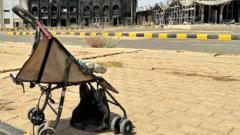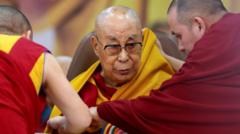As Sudan's army regains control of Khartoum from the RSF, the capital emerges as a shadow of its former self—ravaged, yet bearing the spirit of its residents who yearn for peace and rebuilding amidst fears for their future.
Khartoum's Devastating Aftermath: A Glimpse of Hope Amid Ruins

Khartoum's Devastating Aftermath: A Glimpse of Hope Amid Ruins
Following a brutal conflict, Khartoum reveals a landscape marred by destruction yet filled with resilience and hope for a new beginning.
The capital of Sudan, Khartoum, stands in a state of desolation, marked by the shadows of recent combat between the Sudanese army and the paramilitary Rapid Support Forces (RSF). Recently recaptured after a six-month offensive, the city bears scars from a civil war that has cost an estimated 150,000 lives over two turbulent years. While some celebrate the army's reclaiming of the capital, the streets whisper tales of significant loss and uncertainty regarding the future direction of conflict.
The once-bustling commercial heart of Khartoum has transformed into a haunting silence, echoing the aftermath of battles that reduced government buildings and private enterprises to charred remains. The presidential palace, once a symbol of authority, lies looted and battered, with debris littering the floors and remnants of past opulence overshadowed by destruction. Soldiers, hailed as heroes, revel in their perceived victory amidst destroyed landmarks and the horrific reminders of war.
The atmosphere is conflicted: joyous Eid celebrations occur as the population clings to fleeting moments of normalcy, yet the ruins around them serve as stark reminders of ongoing tragedies. Residents, like activist Duaa Tariq, express tentative hope, recounting the joys of celebrating Eid for the first time in two years, while also wrestling with the trauma and destruction that looms over them.
The resilience of the people surfaces amidst the celebration, including at communal kitchens where survival through hardship is a unifying force. Stories of renewed hope emerge as residents cling to the belief that recovery is possible, despite the loss and the challenges that lie ahead. "Freedom is what's important," declares Kasim Agra, an elderly local, even amid hunger—a sentiment resonating through the hearts of those navigating a fragile peace.
Yet, the journey to rebuild Khartoum poses formidable challenges. Residents express deep concern over the future of freedoms gained, pondering whether the hard-fought rights achieved through prior revolution will persist. Psychologically, the scars of war weigh heavily on the populace, with children bearing the brunt of trauma as communities adjust to life after conflict.
As the eyes of the world shift back toward Sudan, the stories told in Khartoum of fear and hope interweave, reflecting a nation standing on the precipice of potential rebirth in the face of overwhelming barriers—where prayers for peace extend beyond the city limits to those still suffering in remote regions like Darfur. The road ahead remains shrouded in uncertainty, prompting questions that transcend the physical devastation, exploring the deeper implications for a society hungry for stability and progress.





















